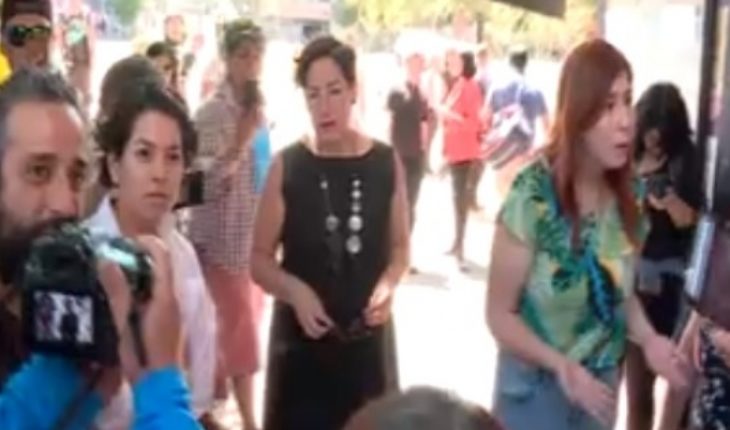Sathing politicians and even intellectuals, in the name of the values of democracy, is in vogue these days. Last week Beatriz Sánchez, José Miguel Insulza and Gabriel Boric were raised. Such a practice is not new; began last year and debuted invoking the value of tolerance against the bigots. Those who invoked it did so with a deal of moral and intellectual satisfaction.
In Chile, until March 2018, almost no one had heard of the paradox of tolerance by Karl Popper (1902-1994). Except, perhaps, the small number of the circle of readers of this British philosopher of Austrian origin. But a news fact made her fashionable. The physical aggression suffered by José Antonio Kast, in the vicinity of Arturo Prat de Iquique University, when he was preparing to give a lecture, was justified by the sympathizers of the aggressors by appealing to the argument of the paradox of the Popper’s tolerance. According to them, Kast had to be silenced because his speech was (or is) intolerant. It is therefore legitimate to silence the intolerant in the name of tolerance. Consequently, the punches, kicks and spit spat outs that Kast received would not merit any reproach.
The argument of the paradox of tolerance was outlined by Popper in the seventh chapter of his book “Open society and its enemies”. In footnote number four of that chapter Popper notes the following: “Unlimited tolerance can lead to the demise of tolerance. If we extend unlimited tolerance even to those who are intolerant—and if we are also not prepared to defend a tolerant society against the pellets of the bigots—the result will be the destruction of the tolerant and, together with them, of the Tolerance. With this approach we do not want to mean, for example, that we should always prevent the expression of intolerant philosophical conceptions. As long as we can counter them through rational arguments and keep them in check in with public opinion, their prohibition would, by the way, be unwise. But we must claim the right to prohibit them, if necessary by force, if they are not intended to impose ourselves on the level of rational argumentation, but, on the contrary, begin to disqualify such reasoning. Thus, for example, they may prohibit their adherents from heeding rational arguments by calling them misleading, and also for them to incite their adherents to counter rational arguments with the use of fists or weapons. We must, then, claim in the name of tolerance the right not to tolerate the intolerant. We must demand that any movement that preys on intolerance be outside the law and that any incitement to intolerance and persecution, in the same way as in the case of incitement to murder, abduction or trafficking, is considered criminal. slaves.”
What would be the characteristics, according to Popper, of intolerance? Of that intolerance that must be legally scared and penalized. It is possible to identify three characteristics of intolerant groups.
1.- Prevent your adherents from being exposed to alternative information flows; or prevent them from exploring ideas contrary to those of their creed; therefore, they prohibit members of the group (sect, I would say) from hearing arguments that call into question tribal beliefs.
2.- They shy away from the debate of ideas and the rational confrontation of arguments.
3.- They replace rational argumentation by the use of physical violence.
It is plausible that behind these characteristics lies a certain imperative eagerness that derives from an absolute belief. It doesn’t matter what the foundation, origin, or genesis of that belief is. What does matter is that this belief has claims of exclusivity and is therefore exclusive of any belief that is not related to its universe.
Popper invites you to penalize behavior, not ideas. Therefore, the characteristics that can be identified in the transcribed paragraph relate to concrete actions. Therefore, Popper does not criminalize certain thoughts, philosophical conceptions, or ideologies, however intolerant they are in themselves. What he criminalizes are behaviors, behaviors, concrete actions. So, for a group to be placed out of the law, it doesn’t matter so much point one, but two and especially three.
Popper’s position is quite similar to that of John Stuart Mill. The latter advocates the most unrestricted freedom of thought and expression, but places limits on behaviors through the principle of harm, insofar as our behavior can harm third parties. As for freedom of thought and expression there is (for me) a key paragraph of Mill in this regard, in which he contends that “even the most intolerant of all churches, the Roman Catholic Church, during a canonization process admits and listens patiently to a devil’s lawyer”. The key expression of the quoted phrase is diction “even the most intolerant”. If even the most intolerant of all churches tolerates countercurrent views, why should they not be accepted in other institutions that are less intolerant? That’s Mill’s argument.
By the way, the devil’s lawyer is a theologian who’s on his way to tear down the evidence of his fellow theologians trying to prove that a blessed performed certain miracles. He therefore challenges the trials and beliefs of those who promote the canonization of a person and this implies not only questioning, but also possibly hurting, the beliefs of those who encourage the sanctification of a blessed.
As you can see, the existence of counter-speech is fundamental for a society to be classified as liberal, Mill would say; open, Popper would say; decent, Rawls would say; pluralist, Berlin would say. For Mill and Popper there is nothing more dangerous than one thought and, of course, than the dictatorship of the politically correct.
Returning to the starting point of this note, then, who would be penalized and put out of the law, according to Popper’s argument, would be those who founded José Antonio Kast, for they did not fight him on the plane of ideas, but to kick , punches and spit. In this case, Kast’s intolerance is of a smaller scale than that of those who assaulted him; for his is at the level of ideas and that of ideas at the level of behaviors. One is tolerable for Popper, the other is not. What Kast’s detractors should do is summon him to the public square, not to stonalize him; but to question it rationally.
Thus, paradoxely, the argument of the paradox of tolerance is reversed precisely against those who invoked it.
Nothing to be surprised about, we are in Chile, a country full of impostors, impostures and folds; country of the priest Karadima and the priest Poblete, Allende and Pinochet, Chang and Garay; country that idolates human rights and gave refuge to the greatest European criminal of the second half of the twentieth century: Erich Honecker.
Does the above mean that we are an incoherent people or, worse, hypocritical? I don’t think so. We are, apparently, a rather shallow, casquivane people and probably a little dyslexic. If we are like this, we cannot be accused of bad intentions, nor can we be accused of deliberately biased reading of reality. We are simply insubstantial, banal and veiled. We are a country that at dawn has a faint flash of lucidity, which at noon is skeptical, in the afternoon is apathetic and at night rabidly fanatical.
Finally, I consider it almost unnecessary to say that speeches such as that of José Antonio Kast—like that of the virtual “ayatolas” and that of countless Savonarola street epigonos—do nothing to improve the deteriorated political coexistence of this country.
The content poured into this opinion column is the sole responsibility of its author, and does not necessarily reflect the editorial line or position of El Mostrador.





